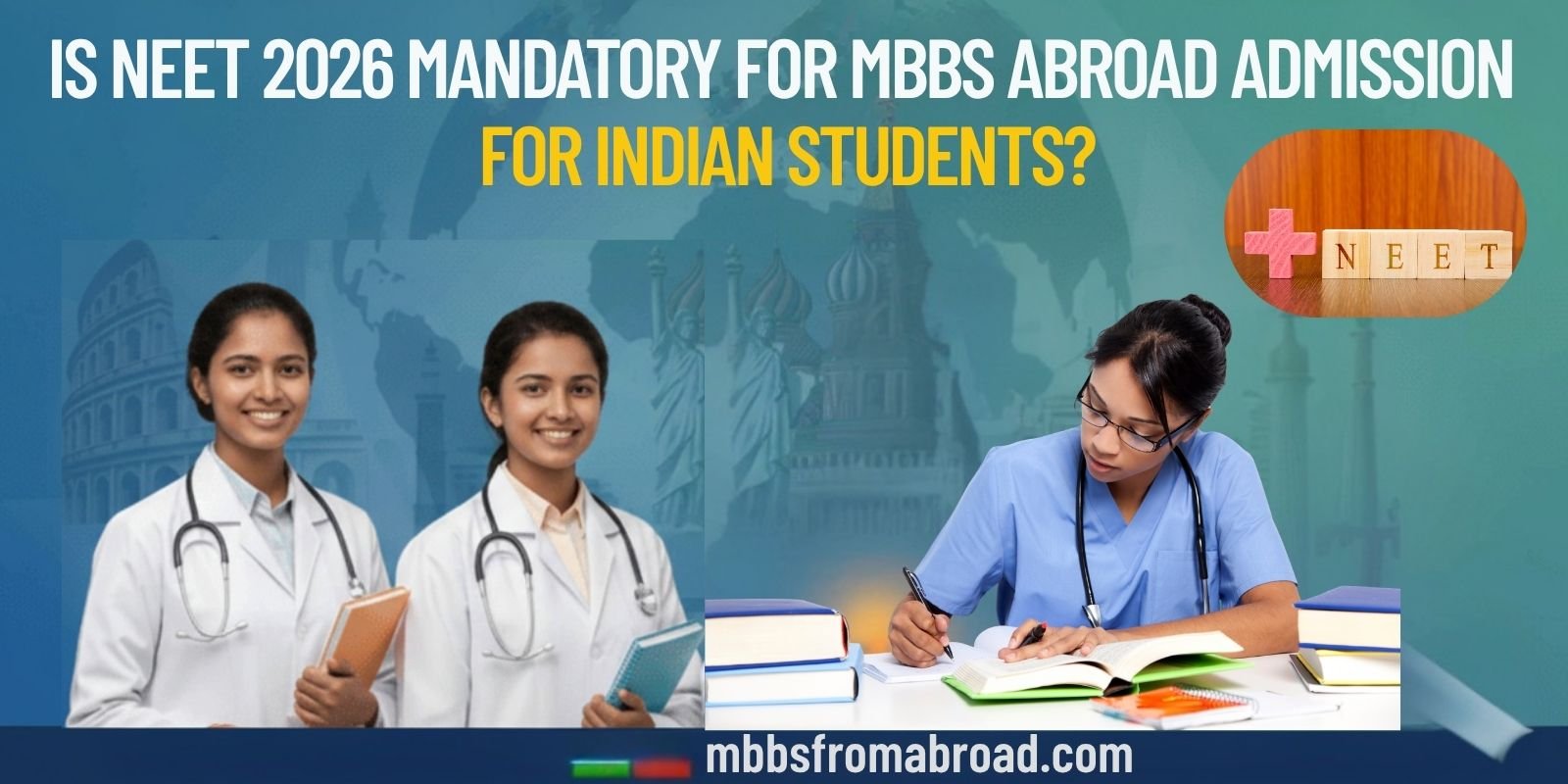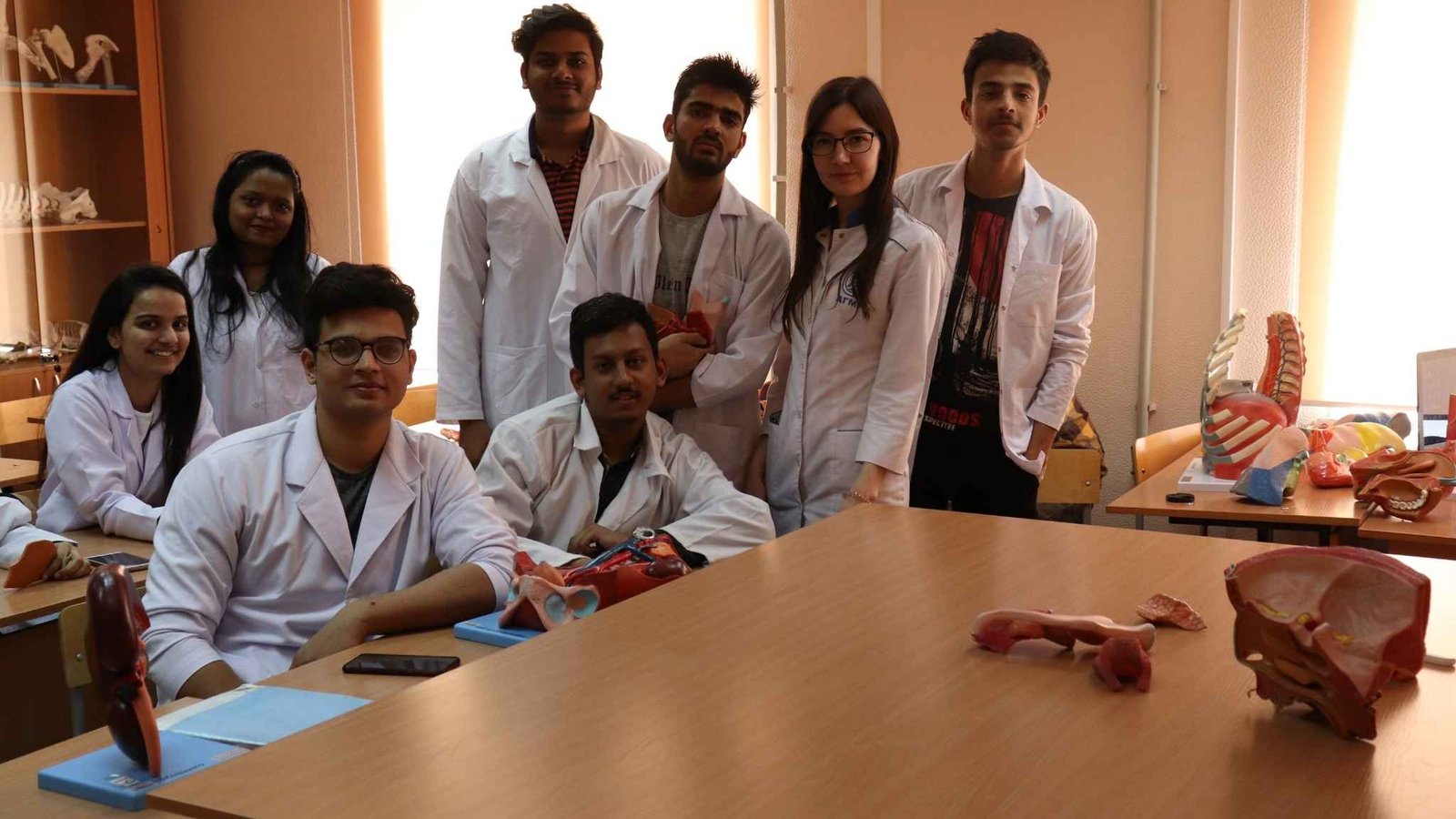NEET 2026 Compulsory for Pursuing MBBS Abroad?

If you’re an Indian student dreaming of studying MBBS abroad, you’ve likely asked: “Do I absolutely need to clear NEET (UG) in 2026 to get in?” The short answer: yes and no, depending on what you want in the long term. Let’s unwind this step by step, break down the rules, dig into 2026 updates, and get you clear on what matters.
Understanding NEET (UG): What It Is and Why It Matters
Overview of NEET UG
NEET UG is India’s national-level entrance test for undergraduate medical courses like MBBS and BDS. It assesses students in Physics, Chemistry, Biology, and eligibility depends on passing 10+2 or equivalent with required marks, meeting age criteria, and other conditions.
NEET’s Role in India’s Medical Education System
In India, if you want to gain admission to a medical college (government or private), you must clear NEET. It standardises the entry bar, ensures minimum competency and is a key checkpoint. Without it, the doors to MBBS in India largely remain closed.
What “MBBS Abroad” Really Means for Indian Students
Popular Countries and Universities for Indian Students
Many Indian aspirants head abroad to countries like Russia, Georgia, the Philippines, China, Nepal, Kyrgyzstan, etc. The appeal? Potentially lower fees, more seats, sometimes simpler admission criteria.
Key Differences Between Studying MBBS in India vs Abroad
When you study MBBS abroad, you deal with: different curricula, different living/cultural settings, language adjustments, and crucially recognition concerns—especially if you plan to come back to India and practise. The admission requirements abroad may differ; sometimes local regulations are more lenient regarding entrance tests.

The Regulatory Framework: India’s Rules for MBBS Abroad
NMC & Foreign Medical Graduates
The National Medical Commission (NMC) governs medical education in India and has guidelines about foreign medical degrees. One of the major concerns is whether your foreign degree allows you to register and practise in India.
The Supreme Court Ruling on NEET for MBBS Abroad
In 2025, the Supreme Court upheld that Indian students who seek MBBS degrees abroad must qualify NEET UG if they wish their degree to be recognised in India. This means: even if you study abroad, for Indian practice you must have cleared NEET.
Is NEET 2026 Actually Mandatory for MBBS Abroad Admission? The Current Position
NEET for Admission vs NEET for Practice in India
Here’s a key distinction:
- For admission to a foreign university: Some countries might not require NEET at all.
- For practice in India after obtaining MBBS abroad: NEET qualification is effectively mandatory.
What the Latest Guidelines Say
According to a 2025 update, “Yes, if you plan to return to India and practice medicine, one must appear for and qualify NEET (UG) 2026.” Another source clarifies: “NEET is mandatory to study MBBS abroad, as per NMC guidelines.” So if your plan includes working in India as a doctor, don’t skip NEET.
Why Some Students Think They Can Skip NEET and Still Study Abroad
Countries/Universities With No NEET Requirement for Admission
Yes—there are foreign universities that admit Indian students based purely on 10+2 marks, language proficiency, and other criteria, without asking for NEET.
The Caveat: Practicing in India Afterwards
While you may get into university, without NEET clearance your degree may not be recognised for practise in India. That’s a big risk. The key question is: Do you want to work in India later, or practise abroad?
Case Study: What Happens If You Study MBBS Abroad Without NEET
Recognition of Degree in India
If you finish MBBS abroad but do not qualify NEET, you could find yourself unable to register with NMC in India. The Supreme Court’s ruling essentially says the foreign degree isn’t valid in India unless you had NEET.
Licensing and the FMGE / NExT Route
Even after foreign MBBS, Indian students must clear the FMGE (Foreign Medical Graduates Examination) or the upcoming NExT for practising in India. Without NEET, the whole chain breaks.
NEET 2026 Eligibility: What You Must Know
Age, Subject & Marks Criteria for NEET 2026
According to latest eligibility updates:
- Minimum age: 17 years by Dec 31 2026.
- 10+2 or equivalent with Physics, Chemistry, Biology/Biotechnology & English.
- For general category: 50% in PCB; for OBC/SC/ST: 40%.
Attempt Limits, Foreign Nationals/NRIs
For 2026, the upper age limit has been removed and attempts are unrestricted. NRIs/OCIs/foreign nationals must meet similar academic & age criteria.
Impact on Your Planning: Should You Appear for NEET If You Want to Study Abroad?
Risk Mitigation: Why Clearing NEET is Safer
Clearing NEET gives you two options: study in India or abroad and return to practise. It’s like having a safety net. If you don’t clear it and study abroad, you risk losing practice eligibility in India.
If You Skip NEET: What Happens to Plan B
If you skip NEET and study abroad, your path could be: finish MBBS abroad → practise abroad or try for recognition in India (which might be denied). So your plan must be crystal clear: Am I staying abroad or returning to India?
Country-Wise Snapshot: NEET Requirements in Popular MBBS Abroad Destinations
Example: Russia / Kyrgyzstan / Georgia
These destination countries are popular for Indian students due to relatively lower fees and fewer seats competition. Many admit without NEET for entrance—but still, for Indian registration you’ll need NEET.
Example: Philippines / China / Nepal
In some Asian countries, English‐medium programs and a large number of Indian students make it attractive. But again, the Indian component (NEET + NExT/FMGE) matters if you return to India.
Cost, Recognition & Career Outcomes: The Big Three for MBBS Abroad
Fee Comparison with India
Foreign universities often advertise lower annual tuition compared to private Indian colleges (which can cost ₹50 lakhs+). Studying abroad can sometimes be more cost‐effective.
Accreditation, Recognition, Returning to India to Practise
Check whether the foreign university is listed in WDOMS, has NMC recognition, and whether your degree will allow you to practise in India.
Career Outcomes
If you plan to practise abroad (USA, UK, Canada, etc.) then requirements will vary (USMLE, PLAB, etc.). But if your goal is India, then NEET + NExT + registration in India matter more.
Frequently Asked Myths vs Reality Around NEET and MBBS Abroad
Myth: “You can study MBBS abroad without NEET and then come back to India and practise”
Reality: Without NEET qualification, your foreign MBBS degree may not be recognised in India.
Myth: “NEET only matters for Indian colleges, not for abroad”
Reality: Even if abroad universities don’t require it for admission, for Indian recognition of the degree it does matter.
Checklist: Crucial Questions to Ask Before You Apply for MBBS Abroad
Is the university listed in the World Directory of Medical Schools (WDOMS)?
Yes—this is a red‐flag if it isn’t. It signals global recognition.
Will my degree be recognised by NMC and eligible to practise in India?
Check NMC’s foreign degree list, licensing path (FMGE/NExT) and whether NEET cleared status is required.
Do I have a valid NEET UG qualification?
If your aim is Indian practice, this isn’t optional—it’s foundational.
What’s Changing in Future: Trends and What to Watch for 2026 Onwards
The Role of NExT (National Exit Test) for Foreign Graduates
From 2027 onwards, the NExT will replace FMGE for foreign medical graduates to practise in India.
Policy Shifts, Global Mobility and Indian Students
As Indian students increasingly look abroad, governments will refine policies (more transparency, stricter accreditation, better counselling) and you should keep an eye on updates.
Conclusion
If you’re weighing whether you need NEET 2026 to study MBBS abroad: here’s the bottom line—if your goal is to practise in India, then yes, you must clear NEET. Without it, a foreign MBBS may leave you unable to return as a doctor in India. If your goal is entirely abroad and you're okay with practising overseas, then admission might be possible without NEET—but you must fully understand the trade-offs, costs, licensing path, and recognition risk. The smart move? Clear NEET, select the right university, verify recognition, and make your plan robust. Your future career deserves that clarity.
FAQs
1. Is it possible to study MBBS abroad without clearing NEET in 2026?
Yes, for admission in some foreign universities it is possible to enrol without NEET—but if you aim to practise in India, NEET will still be required for recognition.
2. If I clear NEET UG but get a low score, can I still go abroad for MBBS?
Yes. Many foreign universities only require qualification (not high rank) of NEET for Indian students planning to practise in India.
3. After completing MBBS abroad, what exam do I need to practise in India?
You will need to clear the FMGE (currently) or in future the NExT, and also have NEET qualification and register with NMC.
4. If I never intend to return to India, is NEET still necessary?
If you are absolutely certain you will practise outside India and the destination country accepts you without NEET, then maybe not. But you risk losing Indian recognition, which limits flexibility.
5. What documents should I check before applying abroad for MBBS?
Ensure:
(a) university is WDOMS‐listed and recognised in that country,
(b) your foreign degree is recognised by NMC (if you plan Indian practice),
(c) you have a valid NEET qualification (if needed),
(d) licensing path (FMGE/NExT) is understood,
(e) cost, living conditions, language of instruction are clear.






